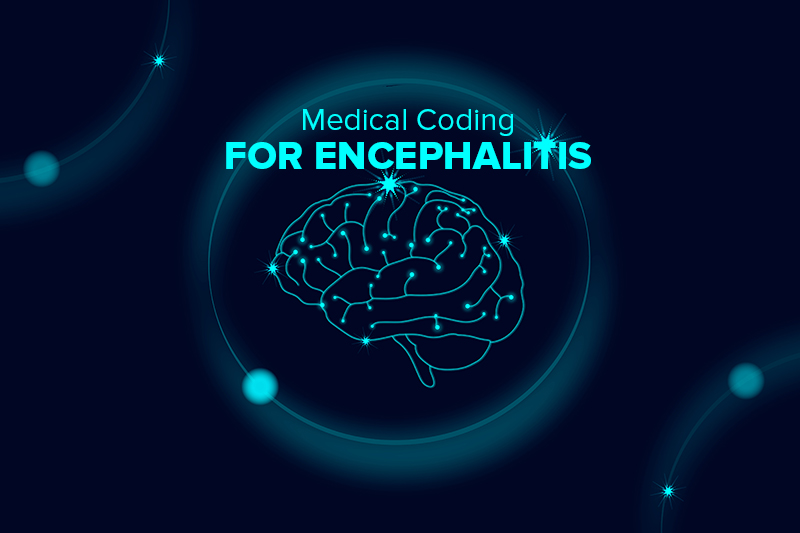Encephalitis is an acute inflammation of the active tissues of the brain. The condition can typically develop due to a direct brain infection from a virus, bacteria or fungus. It can also occur when the immune system responds to past infection or when the body’s immune system mistakenly attacks the brain tissue. Reports suggest that encephalitis occurs in 1 in every 1000 cases of measles. However, in more than 60 percent of cases, the exact cause of this condition is unknown. It is important to conduct a prompt diagnosis and treatment as it is difficult to predict how the condition affects each specific individual. Neurologists treating people suffering from this brain condition must use the correct diagnosis and procedure codes on their medical claims. Most neurologists rely on a neurology medical billing company for accurate clinical documentation.
Types of Encephalitis
As mentioned above, the exact cause of encephalitis is often unknown. Autoimmune inflammation, noninfectious inflammatory conditions and viral and bacterial infections are some of the common factors that tend to cause encephalitis. Encephalitis comprises two main types – Primary and secondary.
- Primary encephalitis – occurs when a virus or other agent (that has been reactive after a previous illness) directly infects the brain. In such cases, the infection may be concentrated in one area or widespread.
- Secondary encephalitis (also called post-infection encephalitis) – occurs from a faulty immune system reaction to an infection elsewhere in the body. In this case, the immune system mistakenly attacks healthy cells in the brain. The condition often occurs 2 to 3 weeks after the initial infection.
Generally, the condition can affect any one. Several factors like – age, weakened immune system, geographical region and season of the year may increase the potential risk of the condition. In most cases, people with relatively mild illness usually recover within a few weeks with no long-term complications.
Symptoms of Encephalitis
The symptoms of encephalitis can range from mild to severe. In most cases, people will have mild flu-like symptoms, such as –
- Headache
- Stiff neck
- Fever
- Fatigue or weakness
- Aches in muscles or joints
- Photophobia or increased sensitivity to light
On the other hand, severe cases of encephalitis may cause symptoms like –
- Confusion, agitation or hallucinations
- Seizures
- Loss of sensation or being unable to move certain areas of the face or body
- Muscle weakness
- Problems with speech or hearing
- Loss of consciousness (including coma)
In infants and young children, signs and symptoms may be –
- Bulging in the soft spots (fontanels) of an infant’s skull
- Poor feeding or not waking for a feeding
- Nausea and vomiting
- Irritability
- Body stiffness
Diagnosis, Treatment and ICD-10 Codes for Encephalitis
Diagnosis of this condition may begin with a detailed medical history review and physical examination. Physicians will also enquire about the symptoms a patient may be experiencing. If encephalitis is suspected, they may recommend certain tests like – Spinal tap or lumbar puncture, Brain imaging with CT scan or MRI, Electroencephalograph (EEG) and blood tests (to identify signs of a viral infection). In severe cases, if the symptoms tend to get worse or if the physicians cannot determine the exact cause of brain swelling, they may recommend brain biopsy, wherein small samples of brain tissue are removed to test for infection.
Treatment for encephalitis consists of a combination of modalities such as medications, taking adequate amount of rest and drinking plenty of fluids. Medications include – Corticosteroids, Antiviral and antifungal medications, antibiotics and Anticonvulsants. In addition, Immunoglobulin therapy and Therapeutic plasma exchange (removing blood from the body and filtering out antibodies) may also be recommended. In severe cases, if physicians determine that a tumor or other growth caused encephalitis, they may perform surgery to remove it.
While documenting diagnosis and treatment, neurologists must report the correct medical codes. Medical billing services provided by reputable companies can help physicians report the correct codes for billing purposes.
ICD-10 Codes Related To Encephalitis
- G04 Encephalitis, myelitis and encephalomyelitis
- G04.0 Acute disseminated encephalitis and encephalomyelitis (ADEM)
- G04.00 Acute disseminated encephalitis and encephalomyelitis, unspecified
- G04.01 Postinfectious acute disseminated encephalitis and encephalomyelitis (postinfectious ADEM)
- G04.02 Postimmunization acute disseminated encephalitis, myelitis and encephalomyelitis
- G04.1 Tropical spastic paraplegia
- G04.2 Bacterial meningoencephalitis and meningomyelitis, not elsewhere classified
- G04.3 Acute necrotizing hemorrhagic encephalopathy
- G04.30 …… unspecified
- G04.31 Postinfectious acute necrotizing hemorrhagic encephalopathy
- G04.32 Postimmunization acute necrotizing hemorrhagic encephalopathy
- G04.39 Other acute necrotizing hemorrhagic encephalopathy
- G04.8 Other encephalitis, myelitis and encephalomyelitis
- G04.81 Other encephalitis and encephalomyelitis
- G04.82 Acute flaccid myelitis
- G04.89 Other myelitis
- G04.9 Encephalitis, myelitis and encephalomyelitis, unspecified
- G04.90 Encephalitis and encephalomyelitis, unspecified
- G04.91 Myelitis, unspecified
- G05 Encephalitis, myelitis and encephalomyelitis in diseases classified elsewhere
- G05.3 Encephalitis and encephalomyelitis in diseases classified elsewhere
- G05.4 Myelitis in diseases classified elsewhere
One of the top ways to prevent viral encephalitis is to take adequate precautions to avoid exposure to viruses that can cause the disease. This includes practicing good personal hygiene, avoiding outdoor signs of viral diseases, and getting vaccinated.
Medical billing and coding for neurology conditions can be complex. For accurate and timely medical billing and claims submission, healthcare practices can outsource their medical coding tasks to a professional medical billing company that provides the services of experienced AAPC-certified coders.




